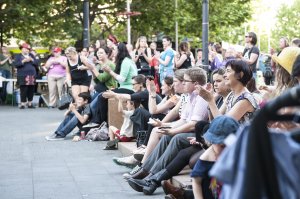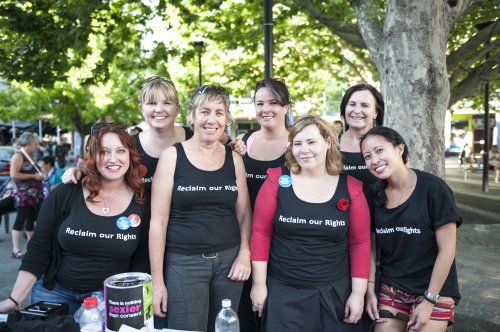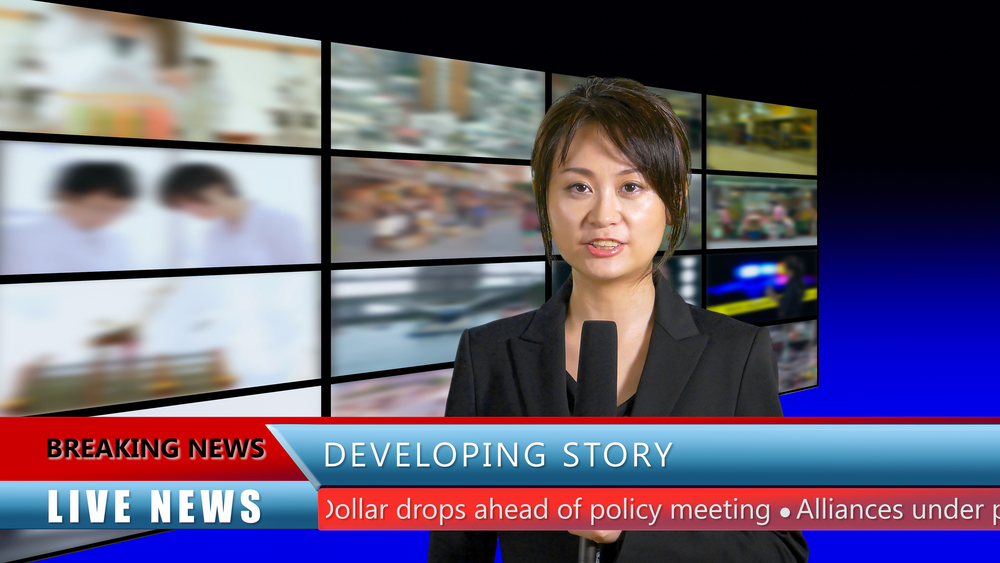Working journalists take it for granted that sources – who you can get to, who will talk and how they talk – are crucial to reporting any story. Academics talk about how the issue is “framed”. Journalists talk about who will pick up the phone and talk.

 (Photos: Canberra Rape Crisis Centre CEO Chrystina Stanford addresses crowds at the annual Reclaim The Night Rally, Canberra)
(Photos: Canberra Rape Crisis Centre CEO Chrystina Stanford addresses crowds at the annual Reclaim The Night Rally, Canberra)
How is this relevant to the media’s reporting of Domestic Violence, and working with media as a means of primary prevention? Well, my recent research suggests that money and time needs to be invested in training and support for victims and survivors willing to share their stories, and on better media skills for the domestic violence sector.
… money and time needs to be invested in training and support for victims and survivors
As well, academics with expertise in the area could do well to overcome their reluctance to pick up the phone when a journalist calls. It’s not particularly constructive to slam the media for a narrow range of inadequate sources when you have expertise, but refuse to be a source yourself.
It’s not particularly constructive to slam the media … when you have expertise, but refuse to be a source yourself.
There is lots of scholarship worldwide telling us what the problems are in the way the media reports Violence Against Women (VAW). However, there is very little about the newsroom processes that lead to those less than ideal outcomes.
That’s not surprising. Newsrooms can be resistant to scrutiny. The pace of work in a daily news outlet, plus the concern for confidentiality of sources, editorial independence and sometimes just plain old instinctive defensiveness can make it hard for academics to study how journalists do their work, and the factors that influence news media outputs.
A current Australian Research Council Linkage Project, which I have lead, has made some contributions to filling this gap.
Newsrooms can be resistant to scrutiny.
I am a former journalist, and thanks to professional connections was able to secure interviews with many journalists involved in reporting VAW. The results shed light on how news media’s reporting of Violence Against Women can be improved, and suggests a need for training and support for victims and survivors willing to tell their stories.
Previous scholarship has suggested consistent problems with media reporting, including an over-reliance on law enforcement sources at the expense of other expert voices.
We found that relationships with sources are key to improving reporting. Social media is playing an increasing role in setting news agendas, partly because the voices of victims and survivors become visible within the newsroom.
… relationships with sources are key to improving reporting
However, victims and survivors who are approached by the media as a result can be left exposed and unsupported.
Meanwhile the police remain a key source for “old media”, with changes in the attitude taken by law enforcement in dealing with domestic violence leading directly to increased and improved media reporting.

We also found that key journalists play a role in improving reporting, and also striking individual cases raised newsroom awareness of domestic violence as a social issue.
Action taken by the domestic violence sector to improve its own media relations had had some impact, but we found very few instances where sector advocates successfully set the news agenda, rather than responding to media requests reflecting already established news priorities.
…we found very few instances where sector advocates successfully set the news agenda
I and my colleagues Dr Georgina Sutherland and Annie Blatchfrord have written an emerging evidence guide for OurWatch on working with news media as a means of primary prevention.
The guide draws on both the ARC Project and also a wide range of other research. It can be read here…
Forthcoming publications from this project will report on focus groups examining how media reporting influences community attitudes, and the success of a journalist-lead social media presence – the Uncovered website – succeeded in gaining industry attention and connecting expert sources with relevant journalists.
The publications already out are:
Simons, MJ & Morgan, J 2017, ‘Changing media coverage of violence against women:: The role of individual cases and individual journalists‘ Journalism Practice.
Simons, M & Morgan, J 2017, ‘Changing media coverage of violence against women:: Changing sourcing practices?‘ Journalism Studies. DOI: 10.1080/1461670X.2016.1266279

The annual Reclaim the Night rally and march will be held in Canberra, starting at Garema Place 6pm on Friday 27th October. The march is organised by the Canberra Rape Crisis Centre (CRCC). Men are welcome to join the march.




